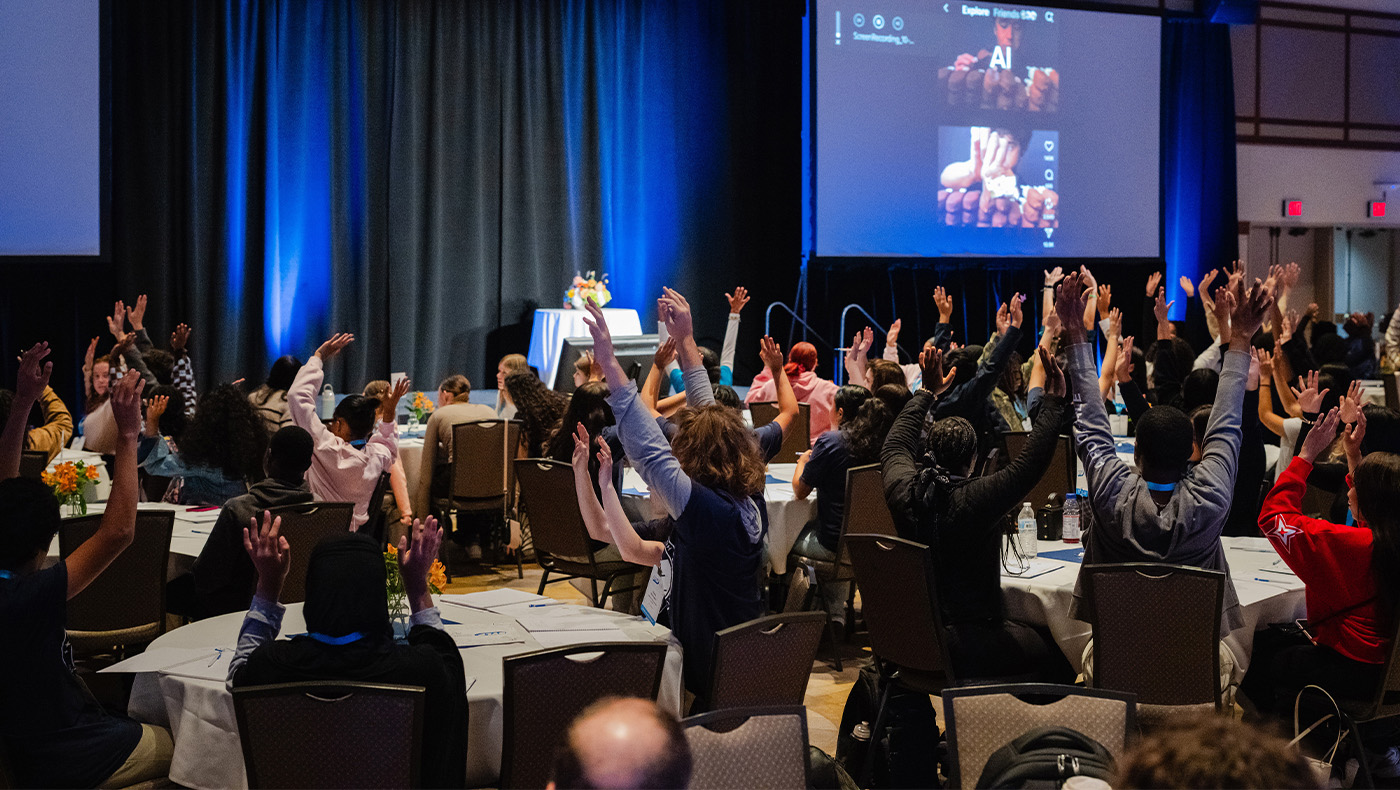At this fall’s Siegfried Youth Leadership Program at Clayton Hall, Dr. Laura Ahlstrom, a researcher in the University of Delaware’s Center for Economic Education and Entrepreneurship, asked a question early in her presentation that caught students’ attention: “How many of you have downloaded or used a free app within the last month?”
Nearly all the hands went up.
But then Ahlstrom listed five fictional apps she created, including FitGrit, a free fitness-tracking app, and StudyBuddy, a free homework-help app, along with hidden data costs.
For example, FitGrit provides users with workout plans and a calorie counter, in addition to disclosing health information, location and an email address. Hidden costs involve sharing health data with insurance companies, selling location data to gyms and sports retailers, and receiving ads for supplements and diet products.
Ahlstrom went through the five apps, and asked the students how many would download each app. Not as many hands this time.
The activity was the central theme of Ahlstrom’s presentation “Data is the New Currency: Understanding the Subscription Economy,” part of the 2025 SYLP fall program.
The Siegfried Group, an entrepreneurial leadership advisory organization founded by UD Alfred Lerner College of Business and Economics alumnus Rob Siegfried, sponsors the semi-annual event in partnership with Lerner’s CEEE and Horn Entrepreneurship and Junior Achievement of Delaware. SYLP’s higher purpose is to help young people transform themselves into better individual leaders to enrich their lives and inspire positive change in their communities.
“We see that our digital data is valuable. Economics is the science of choice, so we can make better choices about how we use our data, and when we understand the value of it, we can use our data wisely,” Ahlstrom said.
“Data can act like money – it’s exchanged, measured and stored. But unlike money in your wallet, you don’t always see when or how your data is spent, because of those hidden costs.”
Ahlstrom and the students then discussed making smart choices about their data, which included limiting monthly data usage, creating strong passwords, installing ad blockers and reading terms and conditions before accepting apps.
“I got a different perspective on economic ideas with data, and it will help me be more mindful in the future with checking certain things on apps and actually taking the time to read through terms and conditions,” said Avery Frieze, a 10th-grade student at Hodgson Vo-Tech High School.
“It puts into perspective that the internet could be a scary place, and that you shouldn’t really trust everyone and everything you see,” added Adriona O’Neal, an 11th-grade student at Hodgson.
It’s a lesson that resonated with students and teachers alike.
“Even myself as an adult, I’ve said, ‘I got this free app,’ and not really thinking about the hidden costs – not monetary, but data costs,” Randi Pro, a Hodgson teacher, said.
“You don’t realize your data, or email address, or face, is now out and sold to the world. I think it raised some eyebrows for a lot of the students and made them think about paying attention to what they’re paying for in a data currency way. So it was eye-opening for all of us.”
Eddie Cortes, a former at-risk student who transformed his life to become a high-impact youth motivational speaker, then gave the keynote address on empowering students to navigate technology, specifically AI, not just as consumers but as creators, innovators and leaders.
“AI is not a living being like you are, but it will amplify who you are. So the conversation is about, how do you plan to use this thing? My hope is to help you become future-ready leaders that take this technology and engage with it, so you can make life a better place for all of us,” Cortes said.
Cortes began by emphasizing that students should use AI as a co-pilot, not an autopilot.
“Using AI as an autopilot technically removes the human. The machine is now responsible for creating the product. So autopilot removes your personality, perspective, worldview, and ultimately your authentic voice,” he said.
“Using AI in copilot mode as a collaborator includes your personality and creativity – what makes you, you.”
Cortes used an example of utilizing AI to generate ideas for an upcoming essay project versus using AI to actually write the essay.
“The first one makes you a better thinker, the second one makes you a shadow of your true self,” he said.
The seminars and keynote combined to provide an impactful day on leadership development for the local students and administrators.
“I’ve been bringing students here since the beginning, and it’s important because they need to be aware they can contribute to their own leadership,” said Hodgson teacher Kelly Bench. “A lot of students think that you need to have straight A’s at the top of the class, and that’s not true. Leadership comes from within, and students need to be reminded that their character ethic will take them much further.
“I also enjoy that they set goals here. It makes (students) realize they’re driving their own car of their life. I think SYLP does a really good job at that, and then we bring it back to the classroom.”
Frieze agreed that she will take the lessons learned into the future.
“All of the seminars have been very helpful,” she said. “It’s been a very cool opportunity, and I feel what I’ve learned today I can use in the future, out in the real world. It’s been a really good experience.”




